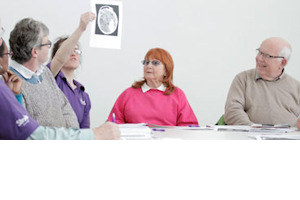PPIE Toolkit
Welcome to the Faculty's Patient and Public Involvement and Engagement (PPIE) toolkit. Here you will find information, templates and resources to support you with your PPIE either as a member of staff, student or public contributor (a member of the public involved and/or engaged with our research and teaching).
We actively involve approximately 800 patients and the members of the public each year in our research and education. From ground-breaking research to engaging the public in educational events, there are many ways we carry out public and patient involvement and engagement at all points in our teaching and research.
Our resources have been co-produced with public contributors and staff from across the University. We would especially like to thank the Faculty's PPIE Forum members, University ethics team and our People & OD and Information Governance team.

Communication
Find out more about PPIE and Social Responsibility (SR) within the Faculty though our different channels of communication.

People
Find out more about who you can go to for PPIE information, advice and guidance within the Faculty.

Events and training
This section features information on events and training which exist across the Faculty for staff, students and Public Contributors involved in PPIE.

Guidance documents and templates
This section features guidance documents and templates specifically for PPIE related activities, including finance, People & OD and information governance.

Get involved
Find out about the different ways members of the public can get involved with the Faculty’s research and teaching.

Case studies
Read case studies on our PPIE activities.

Funding opportunities
Details of funding opportunities available.

PPIE Standards
PPIE Standards are integral towards successfully embedding PPIE in the Faculty’s research and teaching.
Working with our communities
Discover how and why we actively involve and engage patients and members of the public in our research and teaching.
From involving Public Contributors in our ground-breaking research and teaching curriculum, to engaging the public in educational events, there are many ways we carry out PPIE at all points in our teaching and research.
Further information (external)
Links to additional resources.
- NIHR Evidence
- National Coordinating Centre for Public Engagement (NCCPE)
- Research Design Service North West
- Wellcome
University contacts
Faculty of Biology Medicine and Health
Hawys Williams
Social Responsibility and Public Engagement Manager
email: Hawys.Williams@manchester.ac.uk
Samantha Franklin
Social Responsibility Project Officer
email: Samantha.franklin@manchester.ac.uk
FBMH Social Responsibility and Public Engagement Team
email: srbmh@manchester.ac.uk
Social media
- Faculty of Biology Medicine and Health (FBMH) @FBMH_UoM
- FBMH Social Responsibility (SR) @FBMH_SR
- The University of Manchester Social Responsibility @SocialResponUoM
Web
